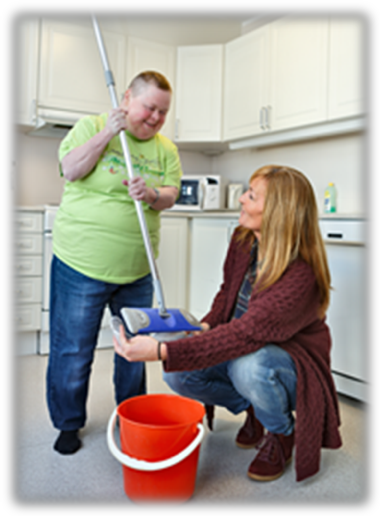Ageing
2. Ageing process
2.5. Early signs of ageing and some consequences
The ageing process starts earlier for PWID, but it is not so different from the rest of the population. Even if ageing is an individual process, people with ID experience relatively large changes in Activity of Daily Life (ADL) skills after 60 years. For people with Downs, such a change already begins at about 40 years of age (9).
 Photo: Jørn Grønlund
Photo: Jørn Grønlund
It may seem that more people with moderate and severe degrees of ID (depending on diagnosis) start the aging process up to 20 years earlier than others. Brain injuries and diseases reduced spare capacity and marks age changes earlier than others did. Other factors affecting an earlier ageing in people with ID are:
- Degree of ID
- Typical features of the syndrome or additional disability, e.g. Down's syndrome and cerebral palsy (CP)
- Progressive disorders
- Trauma and accidents
Early ageing has consequences for:
- When health problems in the ageing process start to make the debts
- Social life decline: retirement, friends die earlier ...
- Experience of quality of life
When you are together with the person every day, it can be difficult to discover the change in functions or early signs of ageing. First, when the person makes 'trouble', you may start questioning their health and life quality. Fast changes in a person’s behaviour or development of challenging behavior can be due to chronic illness, pain, lack of attention, etc.
Early signs on ageing are typically visual and hearing diseases and impairments, heart disease, diabetes and dementia that are more frequent among people with Down’s syndrome than others. Adults with Down’s syndrome experience 'accelerated aging'. They experience certain signs and physical characteristics that are common for aging adults at an older age. The reason for this is not fully understood but is largely related to genes on chromosome 21, as it is associated with the aging process.
 Photo: Jørn Grønlund
Photo: Jørn Grønlund
At the same time, those with cerebral palsy (CP) have special health challenges that cause increasing problems already from 20 to 25 years of age. They may develop reduced muscle function, fatigue, pains, increasing cognitive difficulties, swallow problems and heart-lung problems. The risk of physical and mental congestion with further injury is great if it is not facilitated to get optimal follow-up early in the aging process.
In general, older age often causes health problems that need medical treatment. Polypharmacy is frequent in treatment of people with ID (12). Studies show that mental disorders increase with psychotropic medication. The impact of wrong medication frequently includes a restricted desire or ability to communicate and reduction in general motivation and attention span (2, 13-15).
We should be aware of the lack of knowledge about the medical effects of polypharmacy in persons aged 67 and over, as well as in people with brain damage. Medication may have other effects on brain injuries. This means that observation of medical treatment is crucial.
Usually, the experience of accelerated aging can be seen as medical, physical and functional. Family members and caregivers usually observe people with ID to seemingly 'slow down'. The complexity of this picture is that 'normal aging' in adults with ID is still not fully understood, and therefore it becomes more important to predict and prepare for the aging process. It requires more attention and mapping from the healthcare staff. It is important for the family to keep their eyes and ears open to early changes that make it possible to respond to these changes in a proactive manner.
ACTIVITIES: